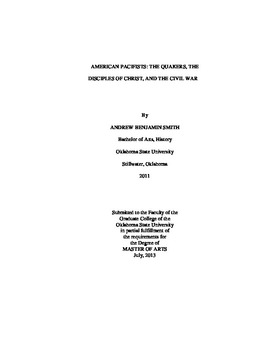| dc.description.abstract | This essay is a comparative study of two religious sects that faced the Civil War. The Quakers and the Disciples of Christ began on two different continents and developed different theologies, but had pacifism in common. They faced the same war with the same view of war, but reacted differently. While the Quakers seem to have largely maintained their peace testimony, the Disciples' pacifism disintegrated under the pressure of intense sectional conflict. After the war, the Quakers initially renewed their commitment to peace and dreamed of a system of international arbitration, but slowly retreated from their traditional positions, including pacifism. The split that occurred among the Disciples during the war worsened, leading to an official separation in 1906. What caused these radically different results from two denominations that endured the same war with the same perspective? Tradition, education, geography, organization, theology, and political views all influenced the outcome. The Quakers had a longer and more viable tradition of pacifism than did the Disciples of Christ. This is seen in the ways they educated their younger members. For all Americans, region was important in determining one's response to the Civil War. Geography affected the strength of the pacifist's convictions. The rigidity of the Quakers organization allowed them to remain united during and after the war, while the dearth of uniformity among the Disciples led to a permanent split. Finally, the Quakers and Disciples of Christ believed that the Christian should respond differently to the civil government. Unlike the Quakers, however, the Disciples never reached a united position on civil government. Some agreed with the Friends that Christians should not be involved at all. Others advocated at least some form of responsibility and involvement. For both the Quakers and the Disciples of Christ, the Civil War proved a catalyst for adherence to their doctrines of peace. | |
